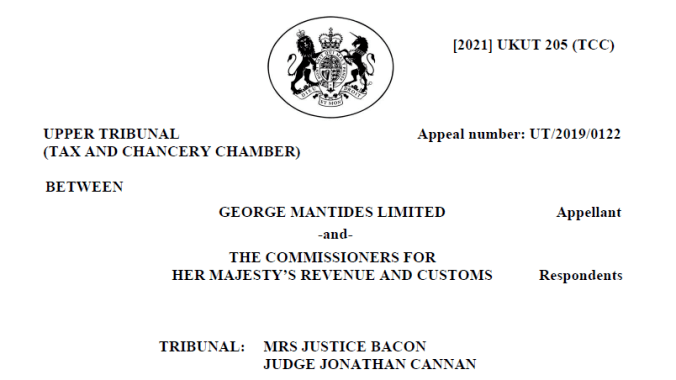Having received a split decision in the First-tier Tribunal (FTT) in 2019, locum urologist George Mantides of George Mantides Limited (GML) appealed part of the decision and took the IR35 case to the Upper Tribunal (UT).
The UTT case has now been partially heard, with an err in law already confirmed, leaving open the possibility of Mantides overturning the decision. The tribunal judges ruled in favour of GML on Grounds 1 and 2 of appeal. However, Ground 3 will require further consideration and will be considered after the outcome of the Professional Game Match Officials Limited (PGMOL) case that has only recently been heard in the Court of Appeal.
These decisions could have widespread implications for one the key indicators of employment status, mutuality of obligation (MOO), and how HMRC interprets and applies it.
UTT ruling could impact IR35 assessments of locum doctors
In the original FTT Mantides hearing, the outcome was a split decision; HMRC won on one of the engagements, GML the other. An appeal was then lodged by the taxpayer to overturn HMRC’s partial victory where Mantides was found to be "inside IR35".
Due to the potential implications of the UTT case, the final ruling is particularly important. It could have far-reaching effects on how all contractors, including NHS locums, are assessed for IR35 tax status.
Traditionally, many locums have been blanket assessed as “inside IR35”. This approach has been reinforced by questionable IR35 guidance provided to the NHS in webinars by HMRC, uncovered by the Independent Health Professionals’ Association and shared with ContractorCalculator in 2018.
If GML is to emerge victorious from the UTT after Ground 3 is considered, it will likely encourage other locum doctors to challenge the blanket determinations they have reportedly suffered.
UTT finds FTT judgement found facts for which there was not sufficient evidence
GML was successful on Ground 1 and 2 of appeal at UTT in respect of identifying an error of law on the subject of the hypothetical contract.
According to the UTT ruling, “the appellant submits that there was no proper basis on which the FTT could find that the hypothetical contract would be terminable early on at least one week’s notice on either side, or that RBH would use reasonable endeavours to provide 10 half-day sessions a week resulting in between 30 and 40 hours work per week for Mr Mantides.”
UTT tribunal judges would not usually be permitted to interfere with the fact-finding of the case as it is reserved for the FTT. However, the UTT found that the appellant’s identifying of errors fell within the principle outlined in Edwards v Bairstow [1956] AC 14.
As a result, the UTT assessed the evidence as follows: “Mr Paulin submitted that Mr Mantides’ case was that there was no notice period. That was supported by the evidence of Mr Jones set out above, who repeatedly confirmed that RBH could terminate Mr Mantides’ contract at any time if he was no longer needed. There was simply no evidence to support any other conclusion.”
The ruling then goes on to clarify the importance of evidence: “the finding as to a notice period of one week appear to us to have been based more on assumptions and what might have been agreed rather than on evidence as to what actually was agreed between the parties.
“We are therefore satisfied that the FTT was not entitled to find that the arrangements under which Mr Mantides worked for RBH required him or RBH to give one week’s notice of termination.”
Mantides’ UTT outcome still dependent on PGMOL MOO findings
However, whether Mantides wins his UTT appeal remains to be seen. This is because Ground 3 has not yet been considered in the UTT, consideration will resume following the outcome of PGMOL vs HMRC in the CoA.
The key point of course is MOO. HMRC continues to maintain its longstanding simplisitc view that MOO just means a contractor gets paid for doing some work. Whereas in the current law clarified by the PGMOL UTT, MOO actually refers to the obligations being more than simply being paid. Should this stand and not be overturned in the CoA, it could impact positively on the Mantides’ UTT case.
But the impact of the decision could be even greater. If PGMOL and GML both win their respective cases on MOO, then HMRC could face much wider consequences, in the form of a renewed focus on the accuracy of its Check Employment Status for Tax (CEST) tool, because:
- CEST does not take account of MOO in the sense that the PGMOL UTT defined;
- CEST would need to be withdrawn because it would not reflect the law;
- Any historic determinations made using CEST would need to be reconsidered because CEST and HMRC were wrong.
ContractorCalculator CEO Dave Chaplin watched the entire CoA PGMOL and notes: “There is a considerable amount at stake here, with the decision in PGMOL and lots of cases are currently stacking up behind it, waiting for the result.
“HMRC has tried and failed twice at both FTT and UTT to convince the judges that their narrow view of MOO is correct, and if they are wrong, then the consequences will certainly be wide reaching.”

